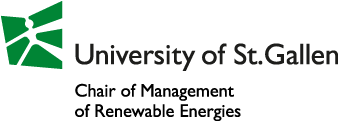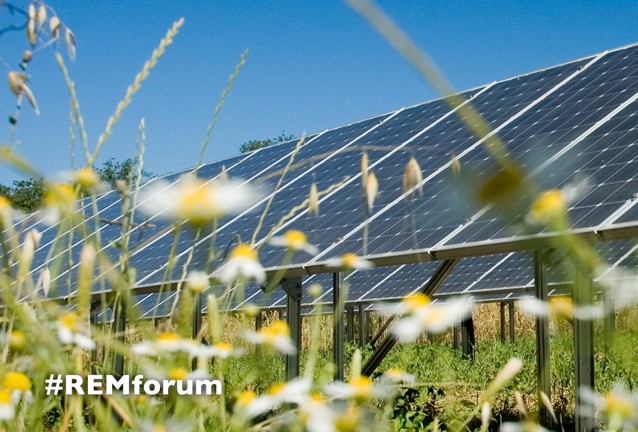Review of 2021
"MANAGING RENEWABLE ENERGY & E-MOBILITY: LEADING THE RACE TO ZERO"
After a series of extreme weather events, public awareness about climate change has reached new levels. Investors, policymakers and courts increasingly realize that managing carbon risk is key, inducing a race to net zero among companies across different sectors. Clean energy and mobility are key to reducing carbon emissions.
The following topics were discussed during the 2021 #REMforum #MaCSHSG #GreenBagSeries:
- How can companies embrace business opportunities in these growing sectors?
- How can recent trends be accelerated to be in line with the Paris agreement?
- And what are the implications for managing social acceptance?
Full Programme
WEBINAR 1
Power to the People? Citizen Co-Investment in the Transition - in Collaboration with MISTRAL
Sept. 24, 2021 => https://youtu.be/TCC4yX3xAGE
- Jakob Knauf, University of St.Gallen (workshop leader)
- Roger Langenegger, Solarify GmbH, CH
- Dr. Arwen Cowell, BürgerEnergie Berlin, DE
Accelerating the transition to low-carbon energy to be in sync with net zero targets is a challenging. With energy traditionally being a low-involvement product, many climate-concerned citizens wonder how they can become part of the solution. Financial participation can facilitate low-carbon investments, but citizen co-investment has an important non-financial dimension as well, allowing people to take ownership of climate solutions and thus potentially reducing social acceptance issues. This webinar will review best practice examples of citizen co-investment in Switzerland and Germany to address the following questions: What are successful financial models to facilitate citizen co-investment? Is financial participation an effective way to increase social acceptance, or is it a rather a tool to deepen the involvement of green customer segments? Which regulatory framework conditions foster or hinder more widespread use of citizen investment?
WEBINAR 2
Overcoming Path Dependence in Firms' non-market Activieties: Perspectives from the Energy & Transport Sector
Oct. 01, 2021 => SORRY, no video available!
- Julia Loder, University of St.Gallen (workshop co-leader)
- Dr. Adrian Rinscheid, University of St. Gallen (workshop co-leader)
- Ed Collins, InfluenceMap, London, UK
- Dr. Fabian Joas, Federal Ministry of Finance (BMF), Berlin, DE
Overcoming path dependence is a classical challenge for innovating firms. In the context of energy and climate change, path dependence has also been referred to as carbon lock-in. Many large firms have now started to realize that overcoming carbon lock-in is a key precondition for success in a world striving for net zero. Some of those low-carbon innovators, however, are facing a second-order path dependence, in that they realize that aligning market and non-market strategies is the next challenge. Historically, those firms have been aligned with their industry peers in shaping regulatory framework conditions, but as their interests start to be more aligned with a net zero future, they may become out of sync with incumbent industry associations. How are firms addressing this next level of overcoming path dependence?
WEBINAR 3
Dynamics of Community Acceptance - in collaboration with MISTRAL and E-LAND
October 8, 2021 => https://youtu.be/M9x0oxumE2s
- Nina Schneider, University of St.Gallen (workshop leader)
- Matthäus Witek Technical Director, ECOwind, Kilb, AT
- Martina Rothenberger, University of St.Gallen, CH
- Dr. Beatrice Petrovich, E-LAND project, University of St.Gallen, CH
When it comes to deployment of low-carbon infrastructures and policies, social acceptance remains a key bottleneck. Procedural and distributional justice have been identified as key success factors, but there are also important emotional influences. Furthermore, stakeholder preferences are becoming increasingly volatile, pointing to the fact that social acceptance is a dynamic process that needs to be carefully managed over time. This webinar will review best practice examples and identify remaining open issues. A particular focus is on Austria, which aims at 100% renewable electricity by 2030, and Switzerland, where the recent vote on the CO2 law has revealed some of the challenges in the dynamics of social acceptance.
Webinar 4
The Emergence of Solar Mobility
Oct. 15, 2021 => https://youtu.be/TiSUBr74ftk
- Stefan Gahrens, University of St.Gallen (workshop co-leader)
- Prof. Dr. Merla Kubli, University of St. Gallen (workshop co-leader)
- Arina Anisie, Innovations for End-Sector Electrification (Power-to-Mobility), IRENA, Bonn, DE
- Dominik Müller, Head Sales, Sun2Wheel, Liestal, CH
Solar photovoltaics, electric vehicles and battery storage technologies are all enjoying increasing popularity among Swiss consumers. This opens new opportunities for the convergence of low-carbon electricity and transport. What is the experience in neighbouring countries with solar mobility? What do we know about consumer preferences? And which promising business models are emerging – has the era of solar mobility as a service begun or will consumers continue to prefer more traditional ownership models?
WEBINAR 5
Net Zero Universities
Oct. 22, 2021: => https://youtu.be/9amBF-9YU_s
- Dr. Moritz Loock, University of St.Gallen (workshop leader)
- Dr. Holly Berman Caggiano, PostDoc Researcher, Princeton University, former Co-Chair, Student Advisory Panel, Rutgers University Climate Task Force, US
- Prof. Günter Getzinger, Project Manager, Climate Neutral TU Graz 2030, AT
- Prof. Christine Peter, Vice Rector for Sustainability, Information and Communication Technology, University of Konstanz, DE
What is the role of universities in addressing climate change? Many universities around the world have recently announced targets to reduce their carbon footprint. More than 700 universities signed the Race to Zero declaration backed by the UN Environment Programme. Activities include measures to reduce emissions on the universities’ premises, for example by switching to renewable energy, tackling emissions from transport, for example by adjusting travel guidelines, encouraging train travel and cycling, aligning university’s investment policies to be in line with the Paris agreement, and encouraging climate action by students. In this webinar, we will hear from universities who have embarked on a net zero path, share some of their achievements so far, and reflect on remaining challenges.
Consumer Barometer of Renewable Energies 2021 - Results
Find the results of the 11th Consumer Barometer of Renewable Energies 2021 HERE and listen to an exciting panel discussion on the most important findings and their implications for business and policymakers. Launch: Nov. 3rd, 2021 in German, simultaneously translated into French and Italian.
- Moderator: Arthur Honegger (SRF)
- Speaker:
- Roland Altwegg (Raiffeisen Switzerland)
- Daniel Büchel (Swiss Federal Office of Energy)
- Rolf Wüstenhagen (University of St. Gallen)
Downloads
- Presentation in German
- Infographics in English, German, French and Italian
- Executive Summary & media release

